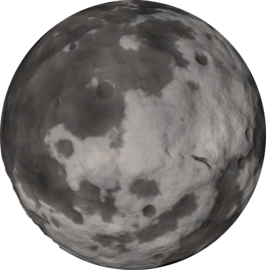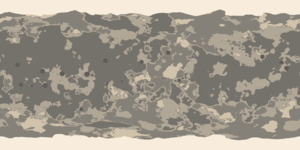Difference between revisions of "Dres"
m (-version template usage and link directly;) |
|||
| Line 1: | Line 1: | ||
{{Infobox/Body}} | {{Infobox/Body}} | ||
| − | '''Dres''' is the fifth celestial body in the [[Kerbol]] star system, and is the first dwarf planet. It is located between [[Duna]] and [[Jool]] in a somewhat eccentric and inclined orbit. It is considered to be the [[w:Ceres|Ceres]] analog for the game. It is similar to [[Moho]] and [[Eeloo]] in that it has no [[atmosphere]] and no natural satellites. Dres has the least gravity of any planet in the Kerbol system. Dres is a dwarf planet because it has not "cleared its neighborhood", due to the presence of "Dres-teroids" nearby. | + | '''Dres''' is the fifth celestial body in the [[Kerbol]] star system, and is the first dwarf planet. It is located between [[Duna]] and [[Jool]] in a somewhat eccentric and inclined orbit. It is considered to be the [[w:Ceres|Ceres]] analog for the game. It is similar to [[Moho]] and [[Eeloo]] in that it has no [[atmosphere]] and no natural satellites. Dres has the least gravity of any planet in the Kerbol system. Dres is considered a dwarf planet by some fans because it has not "cleared its neighborhood", due to the presence of "Dres-teroids" nearby. However, the "Dres-troids" are actually in orbit around Dres, by definition, making them part of a ring system. Therefore, Dres may also be considered a planet. |
== In-game Description == | == In-game Description == | ||
Revision as of 06:52, 24 May 2015
| Dres | ||
| Dres as seen from orbit. | ||
| Dwarf planet of Kerbol | ||
| Orbital Characteristics | ||
| Semi-major axis | 40 839 348 203 m [Note 1] | |
| Apoapsis | 46 761 053 692 m [Note 1] | |
| Periapsis | 34 917 642 714 m [Note 1] | |
| Orbital eccentricity | 0.145 | |
| Orbital inclination | 5 ° | |
| Argument of periapsis | 90 ° | |
| Longitude of the ascending node | 280 ° | |
| Mean anomaly | 3.14 rad (at 0s UT) | |
| Sidereal orbital period | 47 893 063 s | |
| 2 217 d 1 h 37 m 43.1 s | ||
| Synodic orbital period | 11 392 903.3 s | |
| Orbital velocity | 4 630 - 6 200 m/s | |
| Physical Characteristics | ||
| Equatorial radius | 138 000 m | |
| Equatorial circumference | 867 080 m | |
| Surface area | 2.3931396×1011 m2 | |
| Mass | 3.2190937×1020 kg | |
| Standard gravitational parameter | 2.1484489×1010 m3/s2 | |
| Density | 29 242.045 kg/m3 | |
| Surface gravity | 1.13 m/s2 (0.115 g) | |
| Escape velocity | 558.00 m/s | |
| Sidereal rotation period | 34 800.000 s | |
| 1 d 3 h 40 m 0 s | ||
| Solar day | 34 825.305 s | |
| 1 d 3 h 40 m 25.3 s | ||
| Sidereal rotational velocity | 24.916 m/s | |
| Synchronous orbit | 732.24 km | |
| Sphere of influence | 32 832 840 m [Note 1] | |
| Atmospheric Characteristics | ||
| Atmosphere present | No | |
| Scientific multiplier | ||
| Surface | 8 | |
| Splashed | N/A | |
| Near space | 7 | |
| Outer space | 6 | |
| Recovery | 6 | |
|
| ||
Dres is the fifth celestial body in the Kerbol star system, and is the first dwarf planet. It is located between Duna and Jool in a somewhat eccentric and inclined orbit. It is considered to be the Ceres analog for the game. It is similar to Moho and Eeloo in that it has no atmosphere and no natural satellites. Dres has the least gravity of any planet in the Kerbol system. Dres is considered a dwarf planet by some fans because it has not "cleared its neighborhood", due to the presence of "Dres-teroids" nearby. However, the "Dres-troids" are actually in orbit around Dres, by definition, making them part of a ring system. Therefore, Dres may also be considered a planet.
Contents
In-game Description
| “ | Dres is a very small planet. It was the first planet considered to be a dwarf. Its orbit is highly irregular and, together with its size, it took a long time to discover since half the time it was not where scientists expected to find a planet. Due to its nature of frequenting the bad parts of space. This dwarf planet was officially labeled as Not to be trusted by the scientific community. — Kerbal Astronomical Society |
” |
Geography
The surface of Dres appears light grey and is rocky and uneven, similar to that of Mün, with a surface covered in regolith rubble. Unlike Mün, Dres has large patches of what appears to be ice. The highest points are just under 5.7 km in altitude. One notable geographic feature is a canyon just south of the equator, which is several kilometers deep.
Cratering
The surface of Dres has several craters. However, unlike other planetary bodies, none are very prominent, the largest being slightly under 13 km in diameter.
In total, 42 craters have been positively identified. Another 5 are still waiting for confirmation. The spreading of the craters is biased to the western, particularly the northwestern, hemisphere of Dres.
| Quadrant | No. of craters (%) | No. of Craters |
|---|---|---|
| North-East | 19.0% | 8 |
| South-East | 7.5% | 4 |
| North-West | 42.9% | 18 |
| South-West | 28.6% | 12 |
| Total | 100% | 42 |
Biomes
Dres has 8 biomes.
Biome list
|
Reference Frames
| Time warp | Minimum Altitude |
|---|---|
| 1× | Any |
| 5× | 10 000 m |
| 10× | 10 000 m |
| 50× | 30 000 m |
| 100× | 50 000 m |
| 1 000× | 100 000 m |
| 10 000× | 200 000 m |
| 100 000× | 300 000 m |
Gallery
- → Main article: Category:Images of Dres
A topographical projection map of Dres; accurate as of 0.18.
A topographical height map of Dres as of version 0.18.1; made with the ISA MapSat plugin.
Changes
- Added "Dres-teroid" belt
- Added biomes
- Initial Release
Notes






